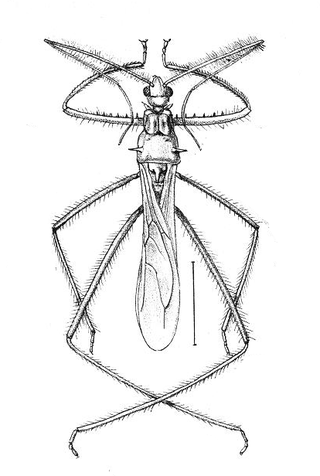Related Research Articles

The Emesinae, or thread-legged bugs, are a subfamily of the Reduviidae. They are conspicuously different from the other reduviids by their very slender body form. They are stalking, predatory insects that can be collected on palm fronds, cliffs, spider webbing, or near lights at night. They walk on their mid and hind legs; the front pair is raptorial. Some groups specialize on spiders. Very little is known about emesines except that many species are found in the tropics. Pedro Wygodzinsky wrote the most recent revision of this group.
Ghilianella is a genus of true bug in the subfamily Emesinae. Fifty-eight species have been described, with a distribution from Guatemala to Brazil. The linear form of the species in this genus allow the young larvae to be carried about by the mother or perhaps the father. The larvae of the young can curl around the parent's thorax.

Ploiaria is a cosmopolitan genus of thread-legged bugs (Emesinae). There are presently about 130 described species.

Stenolemus is a genus of thread-legged bug (Emesinae). Species of this genus are noted for preying on spiders.
The Metapterini are a tribe of thread-legged bugs, assassin bugs of subfamily Emesinae.

Ploiariolini is a tribe of thread-legged bugs, comprising 16 genera and 142 described species. Ploiariolini has a worldwide distribution.
Bagauda is a genus of thread-legged bug in the Emesinae. 18 species are currently known. Many of the species of this genus are associated with caves, some exclusively so. Bagauda is synonymous with the genus Pleias Kirkaldy, 1901, but Bagauda has become more widely used. The genus is restricted to Old World tropics.
Chinemesa is a little-known genus of thread-legged bug (Emesinae) apparently endemic to Borneo. Only four species have been described and the three described by Wygodzinsky in 1966 have not been observed since.
Polauchenia is a genus of thread-legged bug (Emesinae). Only five species have been described.

Empicoris is a cosmopolitan genus of thread-legged bug (Emesinae). Numerous species have been described.

Barce is a genus of thread-legged bugs in the family Reduviidae. There are about six described species in Barce.
Onychomesa is a little-known genus of thread-legged bug in the subfamily Emesinae. Three species have been described, one from India, Japan, and Taiwan.
The Collartidini is a tribe of thread-legged bugs restricted to Africa, Sri Lanka and Taiwan. Wygodzinsky (1966) proposed that this group is the sister group of the remaining Emesinae.

Brontostoma is a neotropical genus of assassin bugs in the family Reduviidae. About 20 species have been described. These species are brightly colored with reds and oranges, and like all members of the Ectrichodiinae, specialize on millipede prey.
Emesa is a small genus of thread-legged bug (Emesinae). Only four species have been described.
Phasmatocoris spectrum is a thread-legged bug species from the genus Phasmatocoris. It is found in South America, having been recorded in Brazil, Colombia, Bolivia, and Venezuela. The Colombia record was taken from a “Palma Real” tree in the forest interior. Phasmatocoris papei sp. nov. is described from French Guiana based on two male specimens. Short taxonomical notes on Phasmatocoris praecellens and Ph. spectrum Breddin, 1904 are provided. An updated key to the species of Phasmatocoris Breddin, 1904 is presented.
Polauchenia protentor is a species of thread-legged bug (Emesinae), recorded from Panama and a Colombian tropical dry forest on the Caribbean coast.
Heniartes is a large genus of assassin bugs belonging to the family Reduviidae; 32 species have been described, all from South America.

The Reduviinae are a subfamily of the reduviid assassin bugs. Many members of the subfamily are nocturnal and their lifecycles are generally poorly known. This subfamily is suspected not to be monophyletic.

Saicinae is a subfamily of the family Reduviidae, or the assassin bugs.
References
- ↑ Helcio R. Gil-Santana; Veracilda Ribeiro Alves; Toby Vincent Barrett; Luiz A. A. Costa. "A new species of Phasmatocoris Breddin (Hemiptera: Reduviidae: Emesinae) from the Amazon, Brazil" (PDF). Zootaxa 1642: 43–51 (2007).
- ↑ Dimitri Forero (2006). "New records of Reduviidae (Hemiptera: Heteroptera) from Colombia and other Neotropical countries" (PDF). Zootaxa 1107: 1–47 (2006). Archived from the original (PDF) on 2014-03-28.
- ↑ Pape, Robert B. (2013). "Description and Ecology of A New Cavernicolous, Arachnophilous Thread-legged Bug (Hemiptera: Reduviidae: Emesini) from Kartchner Caverns, Cochise County, Arizona". Zootaxa. 3670 (2): 137. doi: 10.11646/zootaxa.3670.2.2 . ISSN 1175-5334.